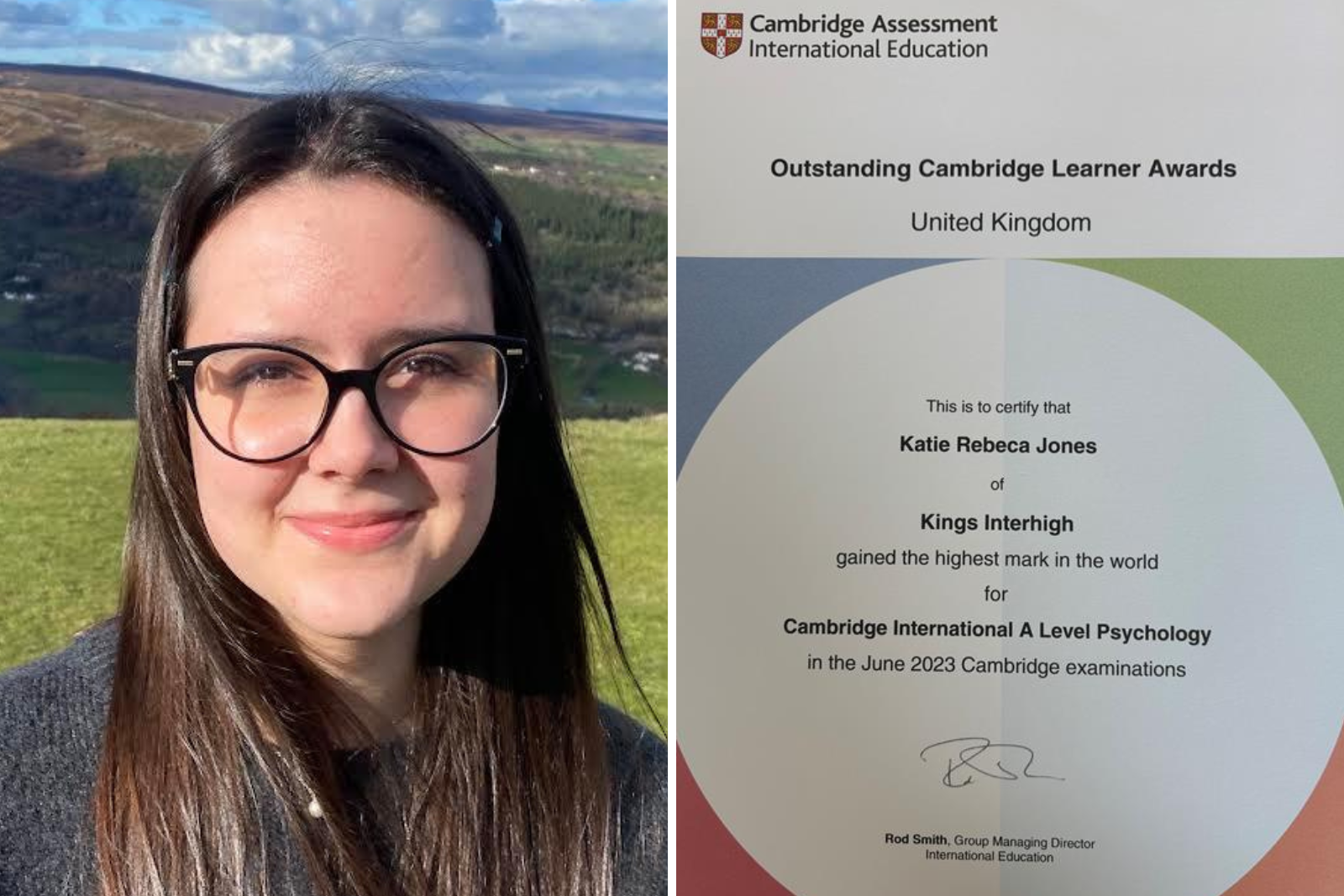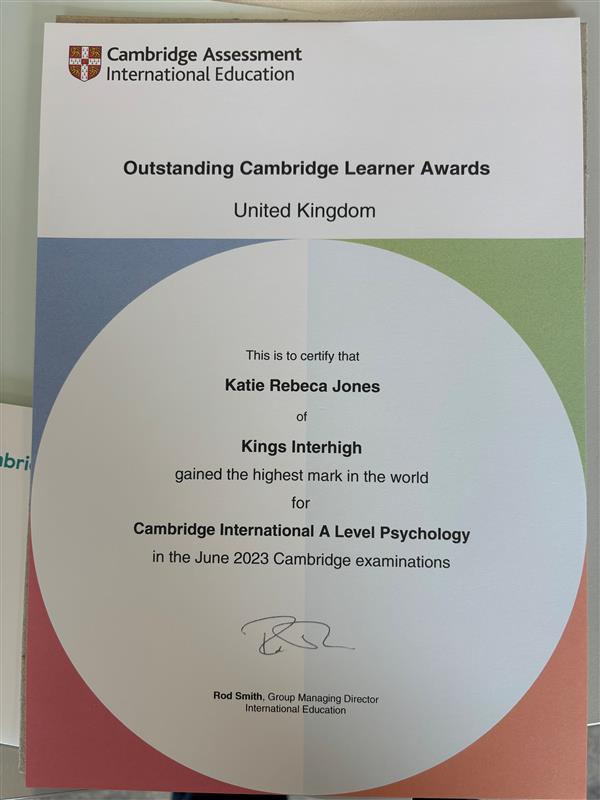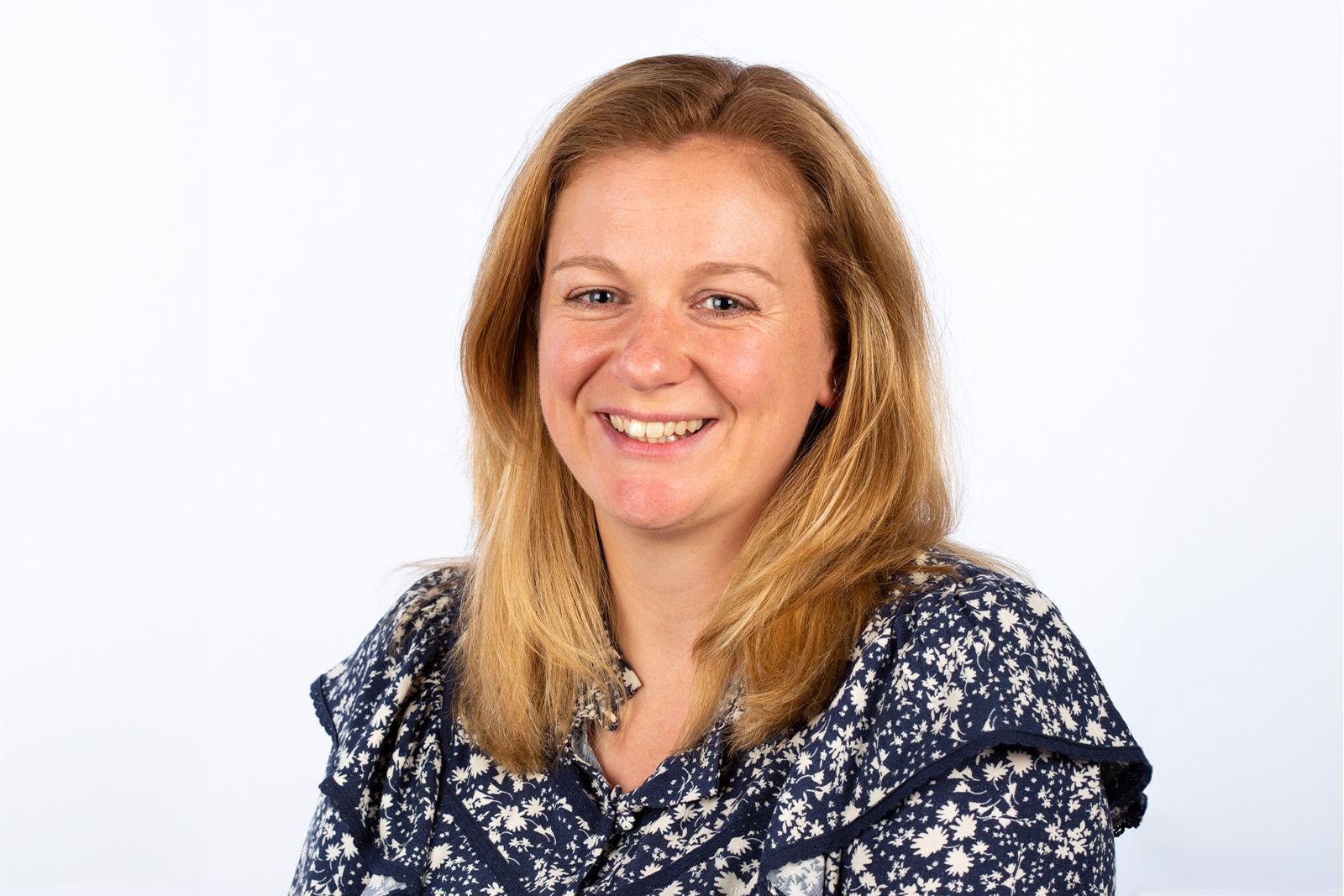
Article March 11, 2024
Online A Level student Katie achieves the highest mark in the world in Psychology
Every student has their own unique goals, and it's always a delight to see them achieve (and exceed!) the ambitions they set their sights on. For King's InterHigh alumnus Katie Jones, one of those goals was to succeed in her A Level studies last year — and that success was nothing short of outstanding.
After two years of passionate dedication and study, Katie has been awarded the Outstanding Cambridge Learner Award for the highest mark in the world in A Level Psychology!
What does it take to achieve such an incredible result? We caught up with Katie to find out how online learning helped her succeed, what she loved most about studying psychology with King’s InterHigh, and her top tips for other students aiming for great grades.
Making the move to online school
For students who have had a difficult time in mainstream education, the idea of a school experience that revolves around you may sound “too good to be true.” That was Katie’s experience too, but her own research into King’s InterHigh spurred on her decision to join our community.
Why did you join King's InterHigh?
After having multiple bad experiences while attending my previous school, I was given the choice to leave and change to King’s InterHigh. At first, I was sceptical because the concept of an online school seemed too good to be true, but after researching the school, I was eager to join.
There were so many motivating factors that led to my decision, such as the flexibility of being able to access my lessons from anywhere alongside being able to access the recordings whenever I needed them, the increased course variety on offer, and the ability to personalise my learning rather than follow the very generalised curriculum that was used in my old school.
A love for psychology
Achieving such an incredible A Level result takes dedication, so it should come as no surprise that psychology is one of Katie’s favourite fields to study. Studying psychology here at King’s InterHigh since Year 10, the start of her GCSEs, Katie says she became increasingly passionate about expanding her knowledge and finding her own areas of interest.
What inspired you to study A Level Psychology?
I chose Psychology at GCSE as it was unique and fascinating. I enjoyed studying all of it at GCSE and felt more knowledgeable in so many new areas, so when it came to selecting my A Levels, I knew without a doubt that I wanted to continue it and expand my knowledge further.
What did you enjoy most while studying Psychology?
I honestly enjoyed all the topics in A Level Psychology, and I think that's what made psychology my favourite subject. Although the topics were quite different, they were all so exciting and had so much depth.
If I had to be particular, I would say my favourite area was the biological approach in AS Level and the abnormality topics in A2, as I found them to be the most challenging and complex as they had many scientific aspects to them.
I found the explanation topics of abnormality to be the most captivating and engaging because they often presented different arguments, which allowed you to use your knowledge of the area to critique each one and come to conclusions as to which you believe is the best explanation for the area being studied.

Achieving incredible grades
Staying consistent can really help you succeed in exams, which is something Katie knows well. Her journey to achieving the top A Level Psychology score started long before exam season, with lesson resources and recordings being key to Katie’s knowledge and understanding.
Everyone learns differently, so it took her some time to find the perfect study technique. But, when she worked out the flashcard method that worked best for her, Katie was suddenly able to “fly through” her revision.
Are there any aspects of online learning that you think helped you succeed?
There were so many features of King’s InterHigh that were highly beneficial to me when it came to studying.
Accessing lesson recordings at any time was extremely helpful as it allowed me to recap the lesson immediately if I needed to make sure I had understood a topic or at a later date if I needed to double-check my notes or add any missing information. This also applies to the resources available at all times, such as PowerPoints and information sheets, which meant I could cross-check my notes for accuracy and ensure all the information I needed was included.
Another of the most beneficial factors of studying at King’s InterHigh was the teachers. All my teachers went above and beyond in supporting me when I needed any questions answered or feedback on a practice answer and preparing us for our exams by providing revision resources, advice and tips.
Who were your psychology teachers at King's InterHigh? Is there anything that stood out about them to you?
At AS Level, I was taught by Abigail Law; at A2 Level, I was taught by Josephine Mole and Rachel Kersey.
Every psychology teacher I had was incredible; they always ensured that every lesson was enjoyable and engaging and that everyone was following and understanding all the content. Additionally, they were also all very understanding and willing to go the extra mile when it came to explaining and helping you if you required additional support.
Their enthusiasm to teach made me look forward to each and every lesson I had.

What was your approach to preparing for exams?
When preparing for my exams, I knew I worked best when I had a detailed plan to help guide me through the process. So, a few months in advance, I made a very detailed plan outlining all the goals I wanted to achieve and when I wanted to accomplish them.
For example, when I wanted to complete a specific past paper, to have everything fully memorised, when I wanted all my revision resources to be finished, etc.
Furthermore, before creating revision resources, I made sure that I focused on making sure I truly understood the concepts and could explain them rather than just purely relying on memorising what they were.
While I was busy studying, I also prioritised studying healthily; I knew that if I forced myself to study when I felt like I needed a break, I would not withhold any of the information I was revising. Therefore, I took frequent breaks to let my mind rest so that I could return feeling refreshed and motivated to continue. In the end, combining all these aspects allowed me to succeed.
Are there any particular study techniques or resources that really helped you during the process?
One of the most crucial preparation methods for my exams was ensuring I spent time in advance experimenting with different revision methods to ensure I could find one that worked best for me. Flashcards were one of my favourite revision methods, but I had difficulty memorising a few of the more complex flashcards.
I used the resources provided in the exam preparation classes to help me solve this problem, as I was introduced to the concept of spaced repetition and decided to incorporate it with flashcards. I used the Brainscape app, which combined these for me, and suddenly, I could fly through all the problematic flashcards.
A Level studies can undoubtedly be challenging — what was most tricky for you, and how did you navigate through that?
Finding out what revision method worked best for me was one of the most challenging aspects at A Level. I had tried many suggested methods but hoped for something to work better. I didn’t let this deter me, and I persevered through trying all the different suggestions I had received until I finally found the one that clicked for me.
At first, I also found adjusting to the workload quite challenging. However, I adjusted quickly after talking to my classmates and realising we were all in the same boat. I just needed time to adjust to change and eventually adapt to the pace required to keep up.
Finally, I found that my nerves about exams were highly challenging and sometimes distracting during my A Level studies. Luckily, support from my teachers and form tutor allowed me to find ways to relax and prepare. Completing past papers as a revision method was one of the best ways to cope with this, as when I took the exam, I knew what to expect, how to pace my writing, and how to answer all the questions.
Looking ahead
After her success in last year’s exams, what’s next for Katie — and what advice does she have for this year’s A Level students? Here’s her best piece of guidance, along with how she’s spending 2024.
Your success is a real inspiration! What advice would you give to fellow students who want to achieve top grades in their own exams?
I suggest that other students start preparing early to prevent themselves from needing to cram and revise any areas they may still be struggling with at the last minute.
I recommend prioritising staying on top of the workload by ensuring you understand the content, your notes are complete, and that you have made revision resources for the topic as you go along. That way, the information is still fresh in your mind.
Furthermore, use the revision resources you create consistently throughout the rest of the year to make sure you constantly remind yourself of the details.
Lastly, set realistic goals for yourself and find an appropriate pace to work towards them, remembering to take breaks when you feel you need them and not overwork yourself.
And what are your own aspirations for this year and beyond?
I am taking a gap year and have many goals I aim to achieve during the rest of the year. There are numerous volunteering opportunities I am looking at partaking in, alongside visiting lots of places within the UK.
I plan to spend the remainder of my gap year experimenting with new areas and hobbies to find something I want to pursue at university later this year.




















